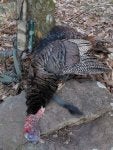I’m not going to totally discount predators having an effect on gobbling but IMO I really don’t think it is a really big factor. Lots of other states have the predators we do and they seem to have hard gobbling birds every year. Ask anyone who travels to other states and they’ll tell you that the birds there seem to hammer just the same as always.
Where the big issue is with declines in turkey populations and lack of gobbling seems to be in the northeastern states. It just so happens that those states experience the worse spring weather of anywhere in the country. Cold, wet, damp, snowy, freezing temps, etc. I GUARANTEE that hatches have been affected for multiple years in a row now. Add to that how low pressure and miserable weather generally shuts down gobbling and its not really surprising to hear it this quiet.
I’ll also add that, in my experience, large bands of jakes harass toms with regularity and suppress gobbling. I experienced that just a few years ago when I hunter a 3 year old longbeard that would not gobble and acted very insubordinate. I called him up one evening to 25 yards but he was on my right side and I couldn’t get the gun moved on him. He snuck in quiet to my decoy spread of 1 jake and a feeder hen but stayed back away from them for a couple minutes, just looking. Suddenly he turned and flew up to roost right behind me. I heard something coming from the opposite direction the the went and suddenly there were 9 jakes that came storming in. They gobbled at the jake decoy, bumped it whacked it, pushed each other around for a bit before moving on down the ridge and roosting for the night. I waited till it was really dark out to sneak out of there and came back the next morning and set up on the opposite side of the tom from where the jakes were roosted. The jakes started choking on their gobbles at daybreak but the tom never made a peep. They finally hit the ground and started moving off in the other direction and then I started calling. This time I was smart enough to not put the jake deke out and just the hen. After my second call sequence I heard him drumming and wingtips dragging on the leaves. There he was at 20 yards, behind some sparse mountain laurel. When he hit a gap, I pulled the trigger. No doubt in my kind that those jakes had been harassing him for awhile and he was not about to gobble and have them come looking to whoop him again.
One other factor I seem to be witnessing, this year at least, is that there’s seems to be a gap in the age structure of gobblers. I’ve seen PILES of jakes (13 in one field last week) and the majority of gobblers that have been harvested around here have been at least 3. There just doesn’t seem to be many loudmouth 2 year olds around this season and so you have the jakes that mainly yelp and cluck and you have the older birds they have played this game before and know they they don’t need to scream their heads off looking for love. These are the birds that sit in the tree in the morning and wait for the hens to fly done under thin before pitching out of the tree to join them and strut. You’re LUCKY if you hear him gobble 1 or 2 times.
I just don’t think they predators or hunting pressure are big factors in lack of gobbling because we have had plenty of predators around this area for quite some time now and some years the turkeys blow up the woods with gobbling and others they just don’t talk. And besides that, contrary to popular belief, turkeys are DUMB. They can be shot at one day and be called right back in the next. I’m sure they it a coyote or fox rushes them one day, they’ve forgotten about it by the next...







